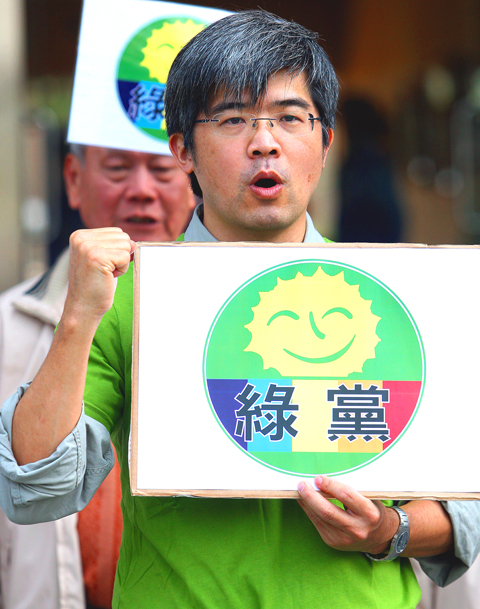Green Party Taiwan (GPT) has nominated former party secretary-general Calvin Wen (溫炳原) for the legislative byelection in Taipei City's sixth constituency, vowing to bring its green platform and to raise environmental awareness in the legislature.
The byelection will be held on March 28 following the resignation of Chinese Nationalist Party (KMT) legislator Diane Lee (李慶安) earlier last month over allegations that she holds dual citizenship. The US Department of State recently confirmed that Lee's US citizenship is still valid. The Nationality Act (國籍法) bans government officials from holding dual citizenship.
“We wanted to nominate someone who can represent us well. We selected Wen because he had been involved with GPT since its founding in 1996, so he has a good grasp of the international Green [parties] and how to connect with them,” GPT Secretary-General Pan Han-shen (潘翰聲) said yesterday.

PHOTO: CNA
Wen said the main thread in his campaign policy was to transform Taiwan's economy into a green one.
“By collecting carbon taxes and capping carbon emissions, public transportation systems will be made more efficient and there will be fewer private cars on the road,” he said.
“Although GPT will only have one seat in the legislature [if elected], I will be the people's eyes and ears in the legislature. I will report to my voters any under-the-table deals,” he said.
Wen's nomination came as a surprise, as GPT had said it would choose a nominee from three potential candidates — Pan, US-born naturalized Taiwanese Robin Winkler (文魯彬) and the party's founding member Chang Shu-mei (張淑玫).
Winkler's announcement that he would bid for GPT's nomination had drawn wide attention, with the Chinese-language media portraying him as the “opposite” of Lee. However, the Nationality Act states that a naturalized Taiwanese cannot run for public office until at least 10 years after his or her naturalization. Winkler was naturalized in 2003.
Asked if Winkler knew that he was not eligible to enter the election, Pan yesterday said: “[Winkler] thinks that there is room [to work with].”
When asked to elaborate, Pan said Winkler could look into the law and obtain candidacy as an independent candidate through registration and appeal.
When telephoned for confirmation, Winkler said: “Yes, I have not given up yet.”
In related news, although the Central Election Commission (CEC) revoked Lee's elected status as Taipei City councilor and legislator, it will not ask her to return election subsidies she received for the elections.
The election law states that a candidate who receives more than a certain number of votes in an election is eligible to receive NT$30 for each vote he or she receives. Having been elected as Taipei City councilor in 1994 and as legislator in 1998, 2001, 2004 and 2008, Lee had received more than NT$8.6 million (US$251,000) in election subsidies.
“Unlike the President and Vice President Election and Recall Act (總統副總統選舉罷免法), the Election and Recall Act for Public Servants (公職人員選舉罷免法) only requires the elected person to give up foreign citizenship before taking the oath of office,” the CEC said in a statement released late on Tuesday. “Having foreign citizenship, according to the law, does not block anyone from running in the election, and thus the CEC would still compensate the candidate.”
ADDITIONAL REPORTING BY LOA IOK-SIN

Chinese Nationalist Party (KMT) Chairman Eric Chu (朱立倫), spokeswoman Yang Chih-yu (楊智伃) and Legislator Hsieh Lung-chieh (謝龍介) would be summoned by police for questioning for leading an illegal assembly on Thursday evening last week, Minister of the Interior Liu Shyh-fang (劉世芳) said today. The three KMT officials led an assembly outside the Taipei City Prosecutors’ Office, a restricted area where public assembly is not allowed, protesting the questioning of several KMT staff and searches of KMT headquarters and offices in a recall petition forgery case. Chu, Yang and Hsieh are all suspected of contravening the Assembly and Parade Act (集會遊行法) by holding

PRAISE: Japanese visitor Takashi Kubota said the Taiwanese temple architecture images showcased in the AI Art Gallery were the most impressive displays he saw Taiwan does not have an official pavilion at the World Expo in Osaka, Japan, because of its diplomatic predicament, but the government-backed Tech World pavilion is drawing interest with its unique recreations of works by Taiwanese artists. The pavilion features an artificial intelligence (AI)-based art gallery showcasing works of famous Taiwanese artists from the Japanese colonial period using innovative technologies. Among its main simulated displays are Eastern gouache paintings by Chen Chin (陳進), Lin Yu-shan (林玉山) and Kuo Hsueh-hu (郭雪湖), who were the three young Taiwanese painters selected for the East Asian Painting exhibition in 1927. Gouache is a water-based

Taiwan would welcome the return of Honduras as a diplomatic ally if its next president decides to make such a move, Minister of Foreign Affairs Lin Chia-lung (林佳龍) said yesterday. “Of course, we would welcome Honduras if they want to restore diplomatic ties with Taiwan after their elections,” Lin said at a meeting of the legislature’s Foreign Affairs and National Defense Committee, when asked to comment on statements made by two of the three Honduran presidential candidates during the presidential campaign in the Central American country. Taiwan is paying close attention to the region as a whole in the wake of a

OFF-TARGET: More than 30,000 participants were expected to take part in the Games next month, but only 6,550 foreign and 19,400 Taiwanese athletes have registered Taipei city councilors yesterday blasted the organizers of next month’s World Masters Games over sudden timetable and venue changes, which they said have caused thousands of participants to back out of the international sporting event, among other organizational issues. They also cited visa delays and political interference by China as reasons many foreign athletes are requesting refunds for the event, to be held from May 17 to 30. Jointly organized by the Taipei and New Taipei City governments, the games have been rocked by numerous controversies since preparations began in 2020. Taipei City Councilor Lin Yen-feng (林延鳳) said yesterday that new measures by